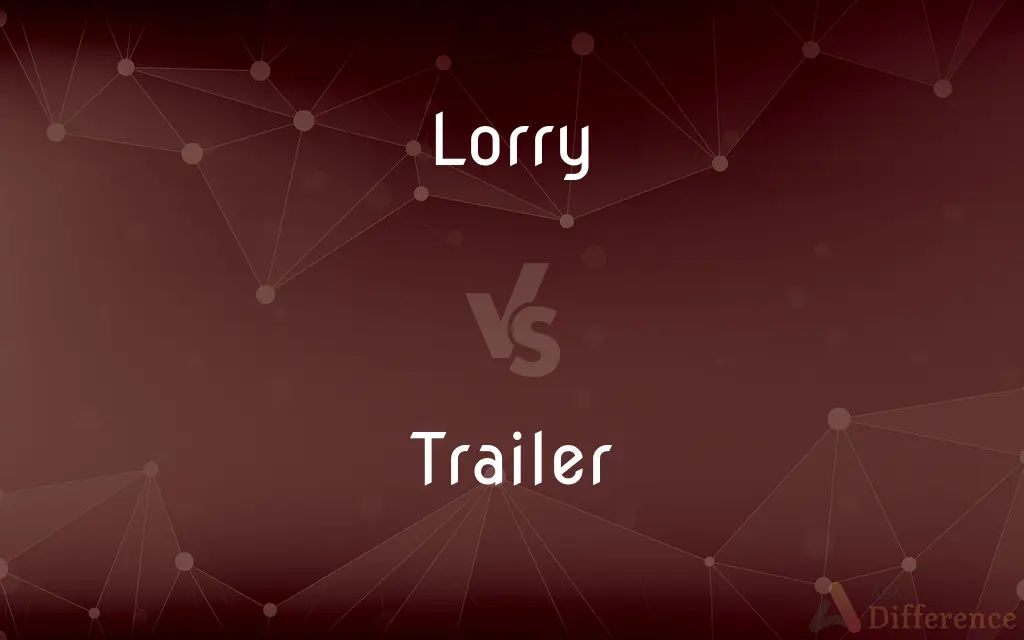Lorry vs. Trailer — What's the Difference?
By Maham Liaqat & Fiza Rafique — Updated on March 21, 2024
A lorry is a large, heavy motor vehicle designed for transporting goods, commonly used in British English. A trailer is a vehicle without an engine, designed to be towed by another vehicle, used for transporting goods or as living quarters.

Difference Between Lorry and Trailer
Table of Contents
ADVERTISEMENT
Key Differences
Lorries, also known as trucks in American English, are equipped with an engine and designed to transport cargo over distances. They vary in size and capacity, catering to different types of freight needs, from small deliveries to large, heavy goods. Trailers, on the other hand, lack an engine and rely on being attached to a powered vehicle, like a lorry or car, to be moved. They are used to increase the cargo capacity and can be specialized for various purposes, including commercial, recreational, and residential use.
The primary function of a lorry is to serve as a self-contained transport solution for goods, with the driver's cabin and cargo area typically integrated into a single unit or articulated in larger models. Trailers serve as an extension of the hauling capacity of another vehicle, coming in various forms such as flatbeds, box trailers, and more specialized versions like refrigerated trailers or car carriers.
In terms of operation, driving a lorry requires a specific type of license due to its size, weight, and the complexities involved in maneuvering such a vehicle. Operating a vehicle towing a trailer also demands additional skills and, depending on the size and type of the trailer, may require a special endorsement or license.
Lorries are essential to the logistics and transportation industry, capable of long-haul deliveries across countries. Trailers offer flexibility and versatility, being detachable and interchangeable, allowing the towing vehicle to be used for other purposes when not needed for hauling.
From a regulatory perspective, lorries and trailers are subject to different sets of laws and regulations concerning safety standards, weight limits, and road usage permissions, reflecting their distinct roles in transport and their impact on road conditions and traffic.
ADVERTISEMENT
Comparison Chart
Definition
A motor vehicle designed for transporting goods
A vehicle designed to be towed for transporting goods or as living quarters
Engine
Equipped with an engine
Lacks an engine
Primary Use
Transport cargo over distances
Increase cargo capacity or serve specific purposes like housing
Operation
Requires specific driver's license
Requires additional skills; may need special endorsement
Versatility
Fixed to cargo transport role
Detachable, used for various needs beyond cargo transport
Examples
Box trucks, tankers, flatbed lorries
Flatbed trailers, car carriers, recreational vehicles
Licensing and Regulations
Subject to commercial vehicle regulations
Subject to towing regulations and standards
Industry Use
Logistics, freight, and transportation
Logistics, commercial, recreational, residential
Compare with Definitions
Lorry
Requires a commercial driving license.
She obtained her lorry license last year to drive the heavy goods vehicle.
Trailer
Vehicle towed by another for transporting goods.
They attached a trailer to the car for the camping trip.
Lorry
Varieties include tankers and flatbeds.
The tanker lorry carried fuel across the country.
Trailer
Can be specialized, like refrigerated trailers.
Perishable goods were transported in a refrigerated trailer.
Lorry
A large vehicle for transporting goods.
The lorry delivered furniture to the new office.
Trailer
Offers versatility in use.
The trailer served as a temporary home during the road trip.
Lorry
Operates independently on roads.
The lorry navigated through the city to deliver the goods on time.
Trailer
Types include recreational and commercial.
The food truck business used a trailer equipped as a mobile kitchen.
Lorry
Integral to freight and logistics.
The logistics company added new lorries to its fleet to meet demand.
Trailer
Increases transport capacity.
The construction materials were hauled in a large flatbed trailer.
Lorry
A large, heavy motor vehicle for transporting goods or troops; a truck
A lorry driver
Trailer
A large transport vehicle designed to be hauled by a truck or tractor.
Lorry
A motor truck.
Trailer
A furnished vehicle drawn by a truck or automobile and used when parked as a dwelling or office.
Lorry
(British) A large and heavy motor vehicle designed to carry goods or soldiers; a truck
Trailer
A short, blank strip of film at the end of a reel.
Lorry
A truck with an open carriage
Trailer
A short filmed advertisement for a movie; a preview.
Lorry
(dated) A barrow or truck for shifting baggage, as at railway stations.
Trailer
To transport by a trailer
Trailered the boat to the beach.
Lorry
(dated) A small cart or wagon used on the tramways in mines to carry coal or rubbish.
Trailer
To travel or live in a trailer.
Lorry
(obsolete) A large, low, horse-drawn, four-wheeled cart without sides; also, a similar wagon modified for use on railways.
Trailer
Someone who or something that trails.
Lorry
To transport by, or as if by, lorry.
Trailer
Part of an object which extends some distance beyond the main body of the object.
The trailer of a plant
Lorry
A large low horse-drawn wagon without sides
Trailer
An unpowered wheeled vehicle, not a caravan or camper, that is towed behind another, and used to carry equipment, etc, that cannot be carried in the leading vehicle.
At the end of the day, we put the snowmobiles back on the trailer.
Lorry
A large truck designed to carry heavy loads; usually without sides
Trailer
(US) A furnished vehicle towed behind another, and used as a dwelling when stationary; a caravan; a camper.
We drove our trailer to Yellowstone Park.
Trailer
(US) A prefabricated home that could be towed to a new destination but is typically permanently left in an area designated for such homes.
The young couple′s first home was in a trailer.
Trailer
A preview of a film, video game or TV show.
The trailer for that movie makes it seem like it would be fun.
Trailer
A short blank segment of film at the end of a reel, for convenient insertion of the film in a projector.
Trailer
(computing) The final record of a list of data items, often identified by a key field with an otherwise invalid value that sorts last alphabetically (e.g., “ZZZZZ”) or numerically (“99999”); especially common in the context of punched cards, where the final card is called a trailer card.
The linked list terminates with a trailer record.
Trailer
(networking) The last part of a packet, often containing a check sequence.
The encapsulation layer adds an eight-byte header and a two-byte trailer to each packet.
Trailer
To load on a trailer or to transport by trailer.
The engine wouldn't run any more so we had to trailer my old car to the wrecking yard.
Trailer
One who, or that which, trails.
Trailer
A wheeled vehicle without a motor, designed to be drawn by a motor vehicle in front of it;
Trailer
A short blank segment of movie film attached to the end; - used for convenient insertion of the film in a projector.
Trailer
A short film consisting primarily of one or more short portions of a film, used in promotions or advertisements shortly before initial release of a film.
Trailer
A part of an object which extends some distance beyond the main body of the object; as, the trailer of a plant.
Trailer
Someone who takes more time than necessary; someone who lags behind
Trailer
An advertisement consisting of short scenes from a motion picture that will appear in the near future
Trailer
A large transport conveyance designed to be pulled by a truck or tractor
Trailer
A wheeled vehicle that can be pulled by a car or truck and is equipped for occupancy
Common Curiosities
How does a trailer attach to a vehicle?
Trailers attach to vehicles through a hitching mechanism, which can vary in design depending on the trailer's size and intended use.
Do you need a special license to tow a trailer?
Depending on the size and type of the trailer, as well as local laws, a special endorsement or license might be required.
What types of goods are transported by lorries?
Lorries transport a wide range of goods, including consumer products, food, construction materials, and hazardous substances.
Can a lorry tow a trailer?
Yes, lorries can tow trailers to transport additional goods, effectively increasing their cargo capacity.
How do regulations differ for lorries and trailers?
Regulations differ in terms of safety standards, weight limits, and road usage, reflecting their distinct sizes, structures, and functions.
Are trailers used for purposes other than transporting goods?
Yes, trailers are also designed for recreational use (like travel trailers), residential purposes (mobile homes), and specialized functions (like mobile kitchens or laboratories).
What's the advantage of using a trailer for recreational purposes?
Trailers offer the flexibility of a mobile living space that can be detached, allowing the towing vehicle to be used separately.
What factors influence the choice between using a lorry or a trailer?
Factors include the type and volume of goods, distance of transportation, logistical flexibility, and cost considerations.
Can trailers be used for long-distance hauls?
Trailers are often used for long-distance hauls, especially when towed by vehicles designed for long-haul transportation, such as semi-trucks.
How do lorries contribute to the economy?
Lorries are crucial to the supply chain, facilitating the efficient movement of goods across regions, which is essential for trade and commerce.
Share Your Discovery

Previous Comparison
Sprayer vs. Atomizer
Next Comparison
Hirer vs. HireeAuthor Spotlight
Written by
Maham LiaqatCo-written by
Fiza RafiqueFiza Rafique is a skilled content writer at AskDifference.com, where she meticulously refines and enhances written pieces. Drawing from her vast editorial expertise, Fiza ensures clarity, accuracy, and precision in every article. Passionate about language, she continually seeks to elevate the quality of content for readers worldwide.














































